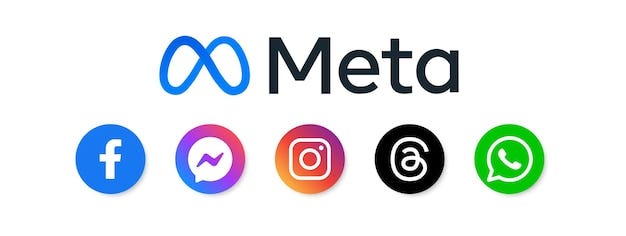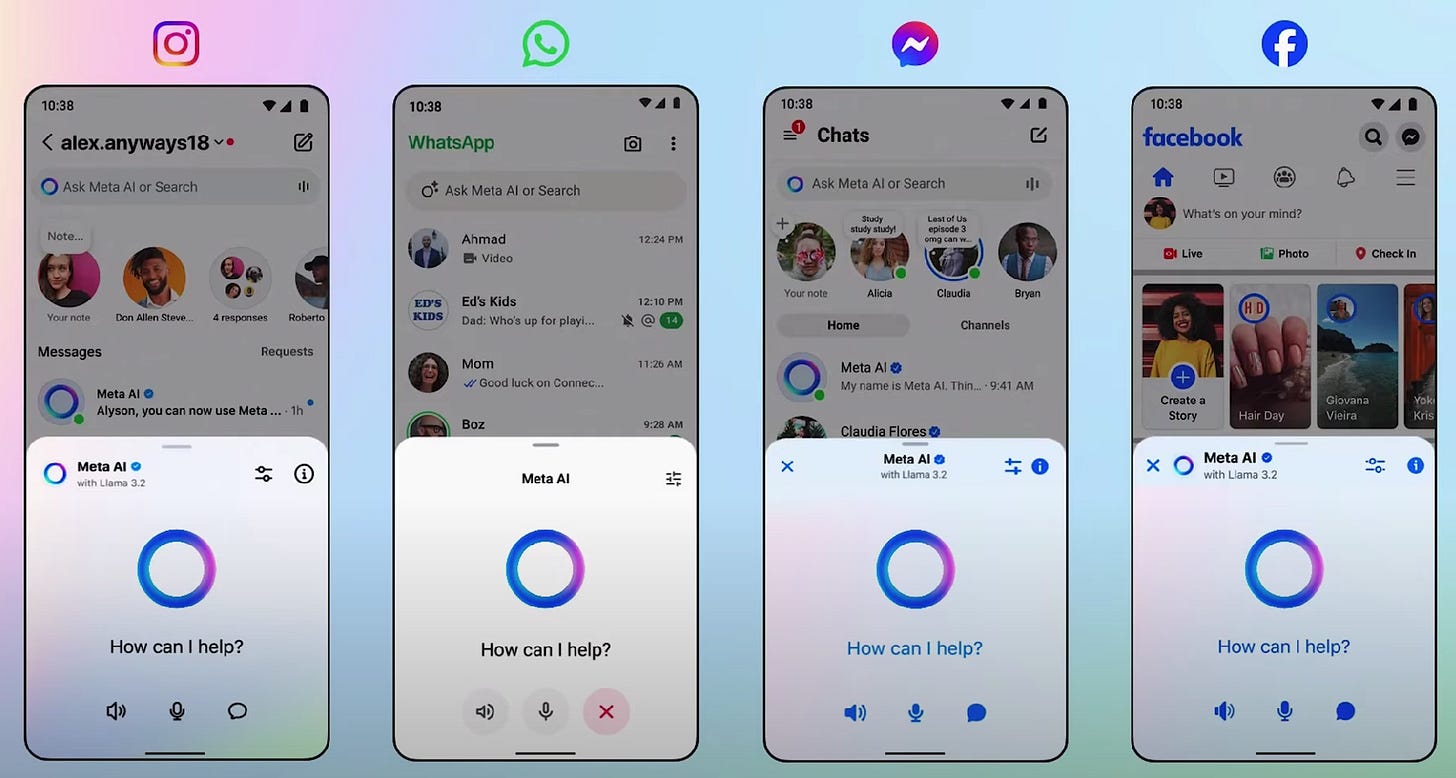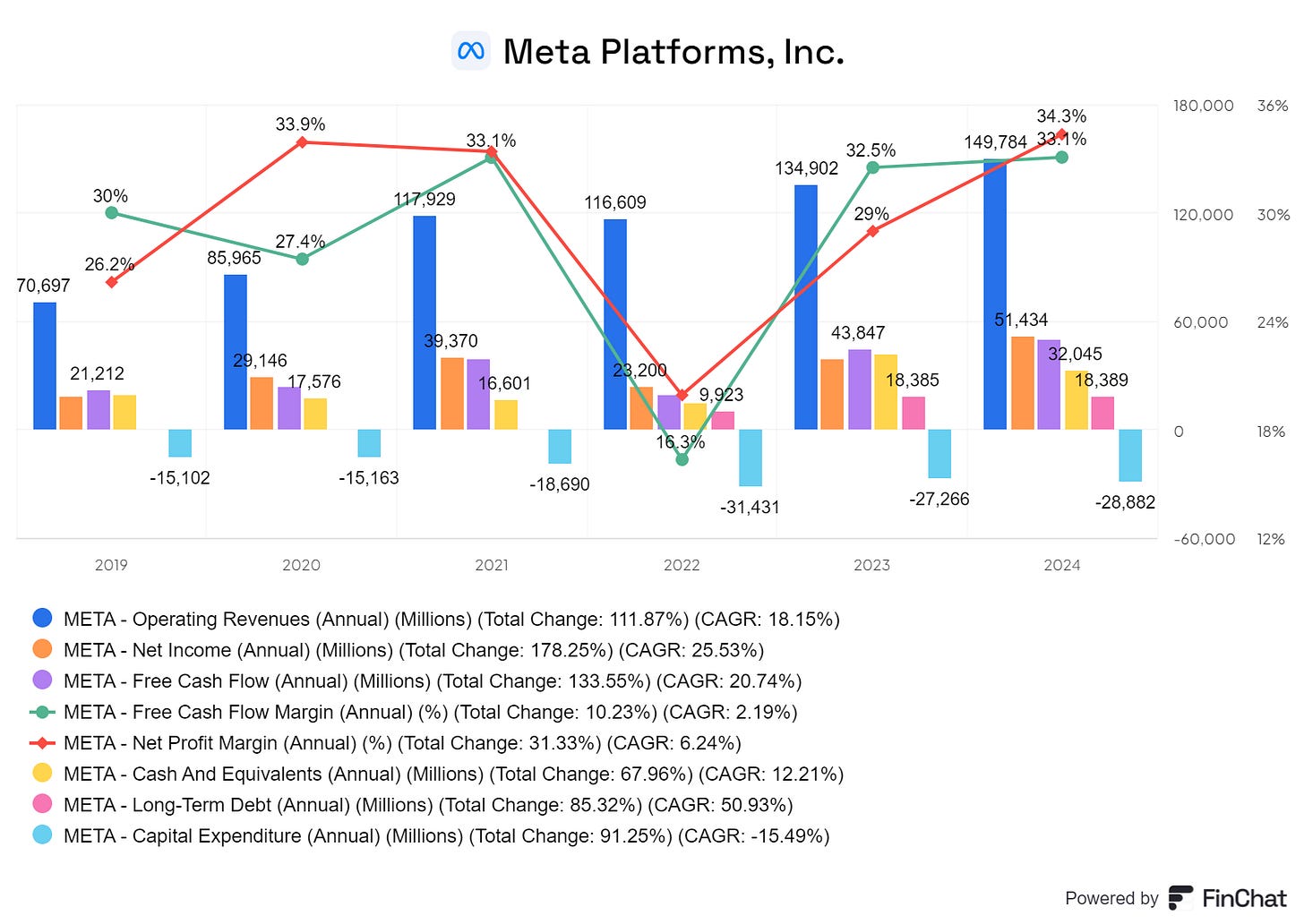Meta | Investment Thesis
Your best friend's best friend.
Facebook, Meta & Mark Zuckerberg.
It is impossible to start without talking about Facebook, the website which started it all or about Mark Zuckerberg, one of the best & richest thieves on earth. If you do not know Facebook's story, you should watch 'The Social Network' which goes over the entire story - and is a pretty good movie.
I wasn't there so I cannot comment on how accurate the movie is but it surely contains some truth as Mark did go through many legal issues through the years with both competitors & old associates.
Even if he indeed stole the idea to interconnect people within Harvard, the truth is that execution is what matters. Everyone has millions of ideas every day, but only those who put effort into them achieve results. Mark did.
This is where everything began. In a room at Harvard, where students had some fun and created an (if not the first) online social network.
Advertising & Network Effect.
I will start here in case you do not know about Meta's business model - which is exactly the same as Google's. More than 97% of the company's revenues come from advertising.
Meta offers free-to-use apps where users create content. Just like for YouTube, the more content there is, the more users there are, leading to more content, and so on. This is what we call a network effect.
“Network Effect refers to the increase in value of a product or service for each user as more people use it. Essentially, the more users a network has, the more useful and valuable it becomes to each individual user.”
Most people end up downloading Instagram to find the content of the stars or influencers they like, or because their friends asked them to. When you reach a certain amount of users, brands start to look at your apps and want to advertise on them to reach your user base with their products.
This is Meta's business: They sell your attention.
Products & Apps.
And how things have changed in 20 years.
Today, Facebook (the company, not the app) was renamed Meta and is one of the largest advertising platforms, owning the most influential social networks in history with more than 3,270,000,000 daily active users - I write the entire number because it's more impressive that way.
And it's still led by Mark Zuckerberg.
Social Networks.
Facebook was only the beginning as a few years later, the comapny made an acquisition which is known to be as significant & valuable as when Google acquired YouTube: Instagram. Acquired in 2012 for $1B in a combination of cash and shares.
Two years later, Meta's management set its sights on another app and purchased it for $16B this time, with 60% of it in shares. An app called WhatsApp, which would join the in-house messaging apps included in Facebook: Messenger.
I won't say nothing happened between 2014 & 2023 as Meta worked on improving its applications & business model as we'll see later, but when it comes to apps, we had to wait 9 years for the lasttest: Threads.
These four apps together account for 3,270,000,000 DAUs. They are at the heart of Meta and are consistently among the top 10 most downloaded apps in every smartphone store.
I won't go over how each one functions because everyone here knows about them - and probably uses one or more daily. But for years, Mark & Meta didn't particularly innovate; they kept acquiring and adopted what was successful from others, integrating concurrents’ features into their own platforms.
Instagram was acquired and the concept of Stories came from Snapchat. I certainly don't need to explain where Threads originated as it's literally a clone of X, formerly known as Twitter. There are more like this.
No, Meta's dominance in the social media landscape doesn't really come from innovations within their apps; it comes from a first-mover advantage with Facebook, from its portfolio which create a network effect but also from having very specialized apps - almost everyone has Facebook & Instagram, but the usage of both is fundamentally different. Most importantly, Meta knew how to monetize their apps and grew a financial strength conccurents couldn’t fight.
The company began truly innovating some years ago, providing the last push it needed to really squash competition and assert dominance.
This overview of Meta might seem harsh as I've called them thieves, directly or indirectly, multiple times, but again, the most crucial aspect in business isn't the idea; it's the execution. Meta executed better than anyone else, and they deserve the position they are at today.
AI.
Some of what many refer to as AI today was known as data mining for years, and Meta became excellent at it over time as collecting & analyzing data became their business model.
Data Mining.
As an advertiser, your role is to distribute targeted ads to your users. To achieve this, you need to understand them. This was done through data mining & profile creation. It is said that Meta & Google likely know you better than you know yourself, and can predict exactly how you’d react to various stimuli.
This comes from data you willingly gave them through your profile but also from everything you write, how you react, how long you spend on each post, picture, or text, on what you press like, and what you ignore. Every second you spend on each of their apps is scrutinized and analyzed by software, which will then feed you what you're most likely to like & consume.
Both content & ads.
Excelling at this is what brought Meta to the top while other social media companies struggled to even monetize their platform. They understood the value of their users' attention & data, and how to sell it.
And they continue thriving doing so.
Advertising 2.0.
While we could still call this data mining, the technologies have evolved and become more & more intelligent and capable of initiative - an opportunity for a better monetization.
I want to label this advertising 2.0; the technology is fundamentally different from simple data mining although the principle is still exactly the same. The difference lies in the computing power, the precision & the initiatives those new softwares can take. And the graphs above confirm this: Meta's advertising service is becoming increasingly expensive.
Why is that? A more efficient technologie, targeting users more accurately, driving more clicks & conversions to more consumers than before.
Llama.
Technology didn't only evolve for advertising; Meta has also been working on other potential applications, the first one being the well-known LLMs & global models.
Meta's AI model is called Llama and is entirely open-sourced, meaning its source code is available online for anyone who want to view or use it. Mark has been emphasizing the importance of open-sourcing, as a much more secure & productive approach.
Llama is an AI model trained on an unimaginable amount of data, thanks to Meta's computing power capabilities - a resource not many companies have. By making this model available to the public, developers can use it and develop their own AI software based on Llama's abilities.
This accelerates innovation as Meta now has access to the capacities & ideas of hundreds of thousands of developers without employing them internally. These developers will create millions of applications usable by people worldwide - and, of course, this expands Meta's network effect simultaneously.
Innovations.
Llama is also used internally for many AI tools which are, or will be, available on the company's apps.
Large Language Model.
Starting with the classic LLM, like ChatGPT, which can be used by text-prompt or by voice command.
This is new and it is hard for me to imagine its potential. We talked about Google and how ChatGPT was a cool tool but not a threat to its Search business. This might be, as we are talking about 3 billion daily active users across these apps. My take is that if Llama is performant enough, many users would rather use it vocally through Instagram than go back & do a query on Google.
This is a social media company venturing into the internet browsing market. And even if Meta isn’t monetizing the service yet, we could argue that keeping users on their apps is already a form of monetization as it’ll allow them to sell more ads.
Personal Assistants.
There’s more. Meta is a social media company and has to propose services its users want.
Mark called this a "Creator AI". An avatar fed from your content with a face and a voice. A copy of you or more precisely, of your content, capable to retrasncript your takes to those who use it.
A demo might make this clearer, starting at 5:05.
This will give content creators’ fan a pretty convincing copy of these content creators with who they can interract, as there’s a point where they certainly cannot interact with everyone. But besides interacting to interact, this will be useful to synthesize information given by creators to their followers.
Imagine an AI trained on all my write-ups; you could simply ask questions to get your answers instead of reading a 48-minute Bitcoin IC… The dream.
Other.
There are many more use cases for Llama as it is nothing but an AI fed on terabytes of data, hence capable of talking about most of it. Some use cases we’ll see below with the hardware, but lots I won’t cover.
Hardware.
Meta’s real innovation came with its hardware, and they went big.
Meta Quest.
They started years ago with virtual headsets, something I still consider today to be kind of a gadget, a niche product, and the lack of demand for the Apple Vision Pro seemed to have proven it. I do believe the Quest has done better than the Vision Pro but I have no data to confirm it yet.
The technology is enjoyable but real-world use cases are limited, professionally & personally as smartphones, computers, or consoles are still better hardware and user experience for everything the Quest tries to do.
Smart Glasses.
The first real and interesting innovation came some months ago now and has been commercialized late 2023.
This product integrates technology into your daily life without the need for a large headset, a very interesting piece of technology. Meta partnered with Ray-Ban to boost brand appeal.
They are equipped with a battery, small cameras & a microphone, allowing them to see what you see and hear what you hear. You can interact with them and with Llama, they function as an AI LLM right on your nose. You can make queries based on your what you see or anything else and your glasses will give you all the information you need.
I’ll push on the fact that you can query your glasses based on what you see, meaning you could ask them “What is this monument?” and Llama would be able to query based on visual and give you an accurate answer. Pretty interesting.
This is the main usage for me: a query tool on your nose. But Meta also highlights its capability to capture content in ways no other camera could, a literal POV.
The downside is that it still requires you to interact with them. It might feel awkward to talk with your glasses in public, although many people already talk with their smartphone so why not? It might just need some time to catch on... or for the product to become even better.
Orion.
Enter, Orion. A blend between the smart glasses & the Quest, which, honestly, is the most impressive piece of technology I've seen lately. The product was revealed a few days ago and I've seen several comments calling this presentation 'Meta's iPhone moment.' It's hard to say; Mark certainly doesn't possess the presentation skills that Jobs did, but in terms of product innovation, they might be right.
“I think it’s gonna be the next major computing platform.”
“The first full holographic augmented reality glasses.”
It is of course not as powerful as the Quest, but users will be able to use it like the smart glasses plus some capabilities of the headset such as holographic digital display, eye & finger tracking, etc.
It's difficult to describe in words. A demo will give a better picture.
As you can see in the screenshot above, they do not come alone; there’s also a bracelet designed to detect your hand & fingers movements, making easier any interaction with your new computer on your nose - this setup partly avoids the discomfort of talking to them.
This is currently a prototype, not yet commercialized so there’s still lots to be done, but it’s already very interesting.
“Our mission is not to build something that is advanced and only a few people can use, we want to take it to the last miles and do all the inovation to get it to everyone.”
Finances.
We’re talking about one of the Magnificent 7 here, one of the company with the strongest financial position we can find on the market.
Nothing to complain about. Revenues grew 12.5% CAGR over the last three years and accelerating, with a bump in the company's road in 2022 as many know, which gave an amazing opportunity as the stock went as low as $90.
Strong margins, very strong cash generation - we're talking about $49.5B of FCF during 2024, more than many companies' total revenues… As always, the market finds something to complain about, and it found the same excuse as for Google.
Capex & Reality Labs.
The complaint is that Meta invests too much in itself and in its future in the part of the company they call Reality Labs, where all the hardware R&D happens. You can imagine the amount of investment needed - or "lost" according to some, to create the Quest headset or the smart glasses. More was spent to develop Orion.
We actually have numbers. Reality Labs lost around $5B... since 2021, to which we should probably add CapEx which never exceeded $30B per year. As a matter of comaprison, Meta did $49.5B of FCF during the last 12 months...
Do we really think this is a big problem for Meta, a sign of an unhealthy company? Investing in AI & Llama and creating what is one of thebest model on the market and some of the best AI applications, hardware technologies which aren’t seen anywhere else? All while still have a bigger FCF generation than expenses?
Eh…
Investors are always worried investments might not yield returns. It's the risk of every investment a company makes and Mark even commented on it very freely in my opinion, during a podcast with Cleo Abram.
“We’re basically making these bets on how much infrastructure to build up for the future. It’s like, hundreds of billions of dollars of infrastructure so I’m clearly betting that this is going to keep scaling for a while. But it is possible that it doesn’t.”
Innovation demands taking risks and I'd rather invest in a company taking risks than in a complacent company.
Polemics & Ethics.
It’s pretty hard to talk about risks when it comes to Meta as the company clearly seems to be a risk free bet for the next years.
Dominant in its field, we could talk a bit about TikTok but there's enough room on the social media market for another application, especially when Meta controls all the others - I put Snapchat aside, let's be serious.
The only risk I see right now for Meta would be a complete boycott from users or advertisers, but the network effect is way too strong at the moment for users to boycott the platform and Mark & the company’s management make it their biggest priority to please advertisers through strict content moderation and other politically correct promotions - this displeases lots of people but this is an investment case, not a political take on content.
As a great movie said: “With great power comes great reponsabilities.”
And when it comes to Meta, the risks are mostly due to ethics & potential polemics. We've had a lot of them through the years and we might have more in the future. I'll focus on one.
Cambridge Analytica.
As I said ealier, it is said that Meta knows you better than you know yourself and to have such knowledge requires collecting & treating a pretty insane amount of data about each individual.
Questions come to know how, why, & by whom those data are used. It should only be used by Meta for its advertising business, but it happened that terabytes of profiles were found on other firms' servers and used… for political advertising.
You will find plenty of documentaries on the subject which will explain much better than I would. The important message I want to share here is that the data Meta possesses on us through its applications is very valuable and could be used… If not illegally, not with the purest intentions.
Friendship, Bullying & Ethics.
Besides scandals, there are other concerns around the implications of these apps on actual trends of bullying & cyber-bullying or other concerns stemming from different studies which conclude that our capacity to socialize is diminishing, and that we have far fewer friends & interactions than we used to. Another topic addressed during the podcast with Cleo Abram.
I personally think it's hard, if not impossible, to know the impact of these apps on our society but they certainly haven't only done good - far from it. I can understand why some do not want to invest in Meta because of this but my view is that if it wasn't for them, it would have been done by someone else and we cannot go against human nature. I wouldn't blame the tools.
I personally do not like Instagram nor social medias in general. But what really matters is to be informed about how these technologies work and if I can recommend another documentary, you guys should watch "The Social Dilemma".
But when it comes to investing, I focus on potential profits.
Opportunity.
Meta could be starting a new revolution due to everything detailed above which I can resume as: being a pioneer in AI & its usage to increase advertising in one part, create real-world use case which could clearly be monetized in a second part while putting their ressources online, open-sourced, driving more potential through external applications.
We’re also starting to see a real demand for its hardware, which wasn’t the case with the meta Quest - demand existed but wasn’t significant. I think otherwise with the Smart Glasses & Orion.
Those are added to its actual strength: More than 3,000,000,000 daily users - I’m still writting the number entirely for its “WAOH” effect, and owning the most used social media platform, ever - with Whatsapp not being monetized at the moment, or very lightly.
It’s very hard to be bearish on Meta but it is also very hard to anticipate growth as most products are new and not perfectly monetized yet. What is sure is that the company has room to manoeuver.
I believe my numbers are conservative in both medium & long term. Business should continue as usual during the next two years as the Smart Glasses might generate some demand, but this is still unclear for now. Between 11% & 14% seems to be business as usual, boosted by their new AI ad systems with stable net margins above 30%.
It's hard to imagine growth & margins long term as it all depends on demand for their hardware, which would also impact margins. It's still hard to imagine Meta growing less than double-digit CAGR until 2029.
Assuming those projections are roughly correct, we'd be a bit overpriced today although not much or not at all if you believe their hardware will spur a new growth leg - I wouldn’t base my investment on this. I'd focus on buying Meta around x9 sales by 2026, which would be around $460 and correlates perfectly with the actual range's bottom.
It bounced on this exact price during the last two earnings as the market wasn't happy with Meta's CapEx & Reality Labs losses, as detailed earlier. Ironically, the stock broke out last week on Meta's excellent results & news about its new products… developed thanks to CapEx & losses.
Ahhh, the market.
Conclusion.
Meta is certainly one of the best companies in the world and seems unstoppable. Mark is a CEO & founder and his breed is pretty rare; not many have built a company and managed it for 20 years while constantly thriving.
It is today in its strongest position, potentially ever - although this is debatable as TikTok is stealing some users' attention. But its strength with new AI tools is hard to match by competition, and this will help Meta advance faster than its competitors & offer always more free services for its user base.
Add to this the very impressive innovation in hardware, with significant potential, and you've got the perfect combination of what could be the company that will dominate the U.S. market for the next years.











